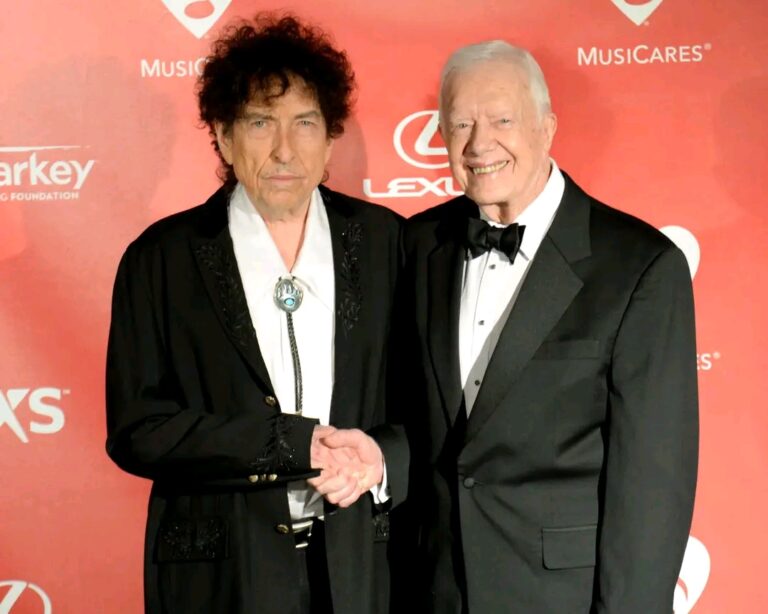In a rare and reflective moment, Bob Dylan recently opened up about his first encounter with former U.S. President Jimmy Carter—a meeting that deeply impacted the legendary songwriter and illuminated the cultural influence of his music beyond the stage and studio.
“When I first met Jimmy,” Dylan recounted, “the first thing he did was quote my songs back to me. It was the first time that I realized my songs had reached into the establishment world. I had no experience in that realm, never seen that side, so it made me a little uneasy. He put my mind at ease by not talking down to me and showing me that he had a sincere appreciation of the songs that I’d written.”
Dylan, who has spent decades as a reluctant voice of a generation, found the encounter both startling and affirming. Throughout his storied career, Dylan’s songs have been steeped in protest, disillusionment, and raw emotion—lyrics that have served as soundtracks for civil rights marches and anti-war demonstrations. But even as his music fueled grassroots movements, Dylan rarely expressed comfort with political institutions or figures of authority. That a sitting governor, and soon-to-be President of the United States, not only listened to but genuinely internalized his lyrics, was something entirely new.
The moment Dylan refers to occurred in the early 1970s, when Jimmy Carter was still Governor of Georgia. Carter, known for his honesty, humility, and progressive values, was not shy about his admiration for the arts and culture—especially when it came to Dylan. During campaign events and public addresses, Carter often cited Dylan’s songs, quoting lyrics from “Blowin’ in the Wind” and “The Times They Are A-Changin’” to underscore his own moral and political beliefs. It was a gesture that, for Dylan, carried both weight and reassurance.
“He didn’t treat me like some celebrity,” Dylan said. “He wasn’t trying to impress me, and he wasn’t using my words as props. He was showing me that they meant something to him personally, and that stuck with me.”
The significance of Carter’s genuine engagement with Dylan’s work also speaks to a larger moment in American history—one where music and politics intersected in a rare and profound way. Carter, a Southern Democrat with a deep religious faith, nevertheless embraced the voice of a countercultural icon. For many Americans disillusioned by the Vietnam War and the Watergate scandal, Carter’s willingness to engage with Dylan’s music signaled a return to authenticity in leadership.
That relationship continued after Carter’s election in 1976. Dylan was invited to the White House, and the two men maintained a respectful connection over the years. In Carter’s 2015 biography, he wrote about Dylan with fondness and admiration, describing the singer as “one of the most powerful poets America has ever produced.” In turn, Dylan has often cited Carter as the only president who ever truly “got” him.
Their connection was also highlighted in the 2020 documentary Jimmy Carter: Rock & Roll President, which explored how Carter’s love of music played a pivotal role in his political outreach. The film featured extensive commentary from Dylan, as well as other musical luminaries such as Willie Nelson and Bono, all reflecting on the role that culture played in shaping Carter’s presidency.
For Dylan, the encounter remains a powerful memory—one that stands apart from the typical fanfare of fame. It was not about politics or power, but about recognition: that the words he had written in private moments of doubt, fury, and hope had resonated beyond the realm of fans and followers. They had touched someone who held the highest office in the country.
“Back then, I never wrote songs thinking they’d end up in the Oval Office,” Dylan said with a slight grin. “I wrote them for people. Jimmy reminded me that the people in power are people too—some of them, anyway.”
Now in his 80s, Dylan remains a creative force, still touring, still recording, still weaving narratives that challenge, inspire, and mystify. But that meeting with Carter, nearly half a century ago, remains one of those rare moments when music crossed an invisible threshold—and a troubadour from Minnesota found common ground with a peanut farmer from Georgia, both guided by the belief that words can change the world.
